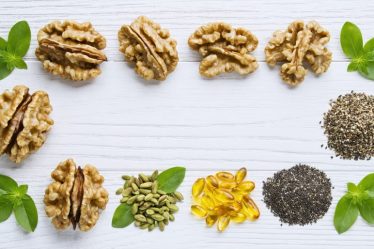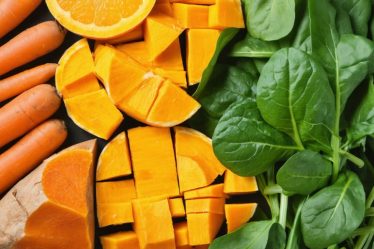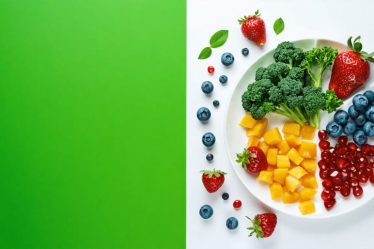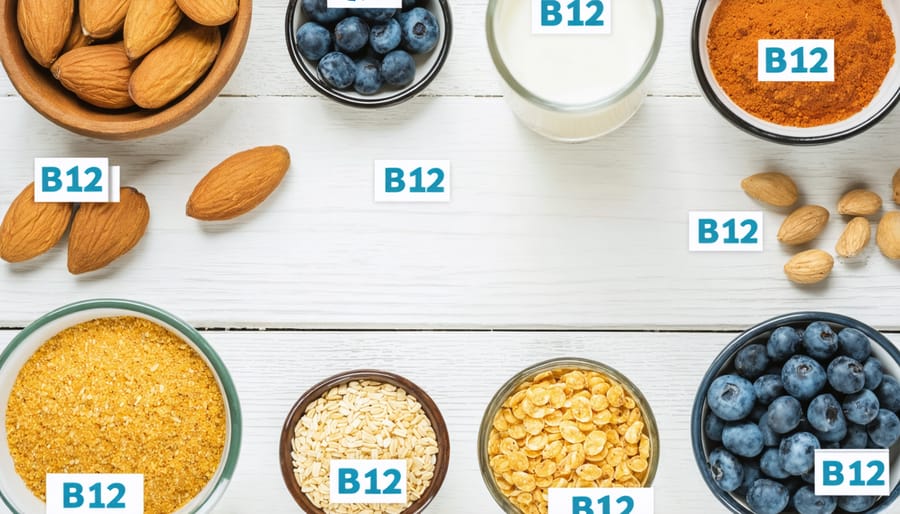
Plant-based B12 doesn’t have to be complicated, even when transitioning to a plant-based diet. While B12 traditionally comes from animal products, innovative solutions now make it accessible to everyone following a plant-based lifestyle. Fortified nutritional yeast, specially cultivated mushrooms, and B12-enriched plant milk offer delicious, natural ways to maintain optimal B12 levels. More than just a nutrient, B12 is essential for energy production, nerve function, and DNA synthesis – making it a non-negotiable part of your daily nutrition plan. Whether you’re a long-time vegan or just beginning to explore plant-based eating, understanding your B12 needs and sources empowers you to thrive on your wellness journey. Let’s explore the most effective strategies for incorporating plant-based B12 into your daily routine, ensuring you never compromise on this crucial nutrient.
Plant-Based B12 Sources: Fact vs. Fiction
Can Plants Really Provide B12?
Let’s clear up a common misconception: plants alone can’t provide vitamin B12. While some packages might claim their vegetables are “B12-rich,” the truth is that B12 is primarily produced by bacteria, not plants. Even organic, unwashed produce doesn’t contain reliable amounts of this essential vitamin.
However, don’t let this discourage you! The plant-based food industry has come up with clever solutions. Many of our favorite plant-based products are fortified with B12, meaning manufacturers add this vital nutrient during production. You’ll find B12 in numerous fortified plant-based milk alternatives, breakfast cereals, nutritional yeast, and even some meat substitutes.
I remember when I first learned this fact at a nutrition workshop – it was a real eye-opener! Understanding this relationship between plants and B12 helps us make informed choices about our nutrition. While we can’t rely on plants alone for B12, we can absolutely thrive on a plant-based diet by including fortified foods and supplements in our daily routine. It’s all about being mindful and making sure we’re getting this important nutrient from the right sources.
Fortified Foods: Your Daily B12 Heroes
Good news, fellow plant-based friends! Getting your B12 fix is easier than ever, thanks to the growing variety of fortified foods available in your local grocery store. Let me share my favorite B12-packed heroes that make hitting your daily requirements a breeze.
Plant-based milk alternatives lead the pack, with most soy, almond, and oat milk varieties containing about 1.6 micrograms of B12 per cup. My morning bowl of fortified cereals typically provides around 2.5 micrograms – talk about starting the day right! Nutritional yeast, affectionately known as “nooch” in our community, is another powerhouse, offering up to 2.4 micrograms per tablespoon while adding a delicious cheesy flavor to your dishes.
Don’t forget to check out fortified plant-based yogurts (1.5 micrograms per serving), meat alternatives (2.5 micrograms per serving), and even some brands of tofu. When shopping, just remember to scan those nutrition labels – manufacturers are constantly updating their fortification levels to meet our needs.
Pro tip: Mix and match these fortified foods throughout your day for the best results. I love sprinkling nutritional yeast on my morning toast and ending the day with a creamy fortified plant milk smoothie!
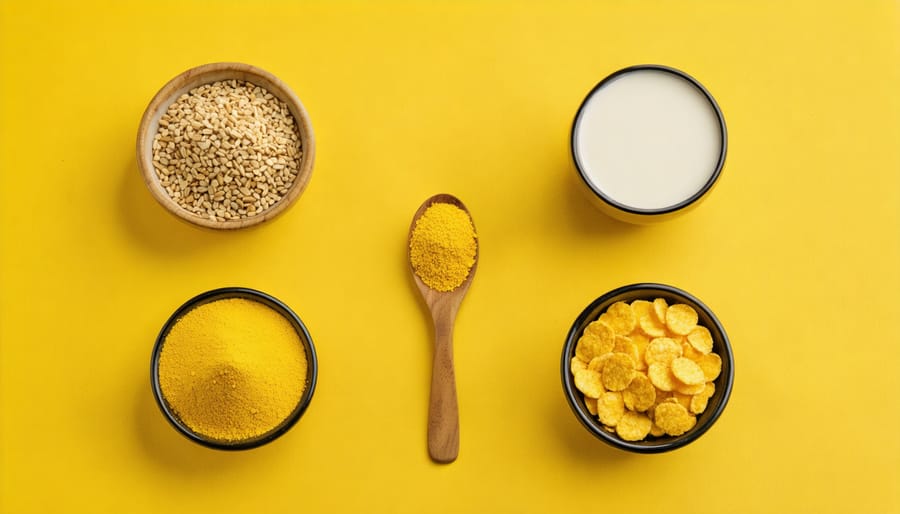
Smart Supplementation Strategies
Choosing Your Perfect B12 Supplement
When I first went plant-based, navigating the world of B12 supplements felt overwhelming. Trust me, you’re not alone if you’re feeling the same way! Let’s break down your options to make this decision super manageable.
Cyanocobalamin is the most common and budget-friendly form you’ll find. It’s synthetic but highly stable and well-researched – perfect if you’re just starting out. Methylcobalamin, while pricier, is the active form of B12 that your body naturally uses. Some people swear by it, especially those who prefer a more natural approach.
B12 supplements come in various formats to suit different preferences. Sublingual tablets that dissolve under your tongue are my personal favorite – they’re convenient and absorb really well. If you’re not a fan of tablets, B12 sprays offer a great alternative. For those who prefer a once-and-done approach, there are weekly or monthly high-dose options available too.
When choosing your supplement, consider these key factors:
– Dosage (aim for at least 2000mcg weekly or 250mcg daily)
– Format preference (tablet, spray, or gummy)
– Your budget
– Third-party testing certification
– Additional ingredients (especially if you have allergies)
Remember, the best supplement is the one you’ll actually take consistently. Start with a basic cyanocobalamin supplement if you’re unsure – you can always switch later as you learn what works best for your body.
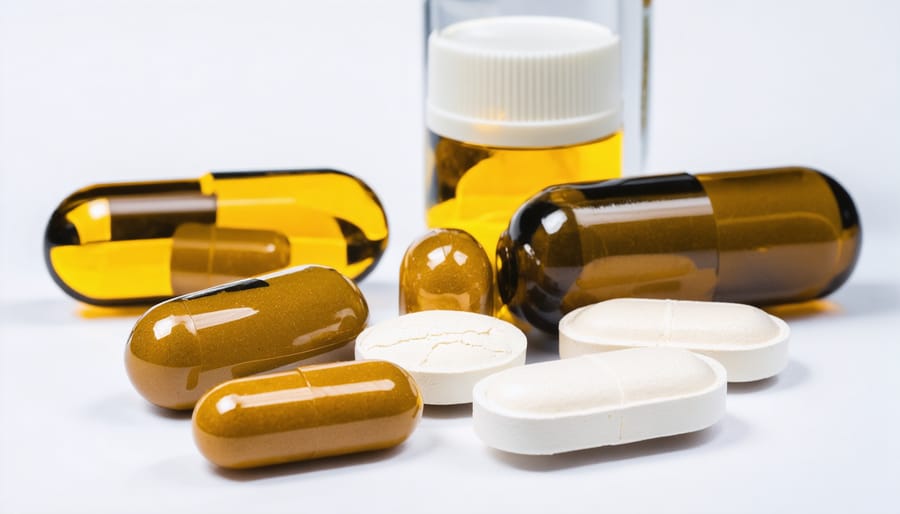
Timing and Dosage Made Simple
Getting your B12 timing right doesn’t have to be complicated! As someone who’s navigated this journey myself, I’ve found that taking a B12 supplement first thing in the morning, about 30 minutes before breakfast, works best. This routine helps with optimal absorption and becomes as natural as your morning coffee ritual.
For most adults following a plant-based diet, experts recommend 2.4 micrograms of B12 daily. However, since everyone’s body responds differently, it’s worth considering a personalized nutrition approach to find your sweet spot.
Here’s my simple supplement guide:
– Daily supplement: Choose a 1,000-microgram cyanocobalamin supplement
– Weekly option: Take 2,000-2,500 micrograms once a week
– Fortified foods: Track your intake from plant milk or nutritional yeast throughout the day
Pro tip: If you’re new to B12 supplementation, start with a higher dose for the first few weeks to build up your stores. I typically suggest 2,000 micrograms daily for two weeks before settling into your regular routine.
Remember to store your supplements in a cool, dark place, and check the expiration date regularly. If you experience any unusual symptoms or concerns, always consult with your healthcare provider to adjust your dosage as needed.
Easy B12-Rich Meal Ideas
Breakfast Boost
Start your day right with these B12-boosted nutritious breakfast options that are both delicious and nourishing. My favorite morning kick-starter is a fortified plant milk smoothie bowl topped with B12-rich nutritional yeast and hemp seeds. Simply blend your favorite frozen fruits with fortified soy or almond milk, then sprinkle with a tablespoon of nutritional yeast for that cheesy, nutty flavor.
Another fantastic option is whole-grain toast topped with fortified vegan butter and scrambled tofu seasoned with nutritional yeast, turmeric, and black salt for that eggy flavor. For those busy mornings, prepare overnight oats using B12-fortified plant milk, chia seeds, and a sprinkle of nutritional yeast – trust me, you won’t even taste it!
Don’t forget about the power of breakfast sandwiches: Layer B12-fortified tempeh bacon with avocado on an English muffin for a satisfying start. For a sweet twist, try coconut yogurt parfait made with fortified plant-based yogurt, granola, and fresh berries. These options ensure you’re getting a good dose of B12 while enjoying a delicious breakfast that keeps you energized throughout the morning.
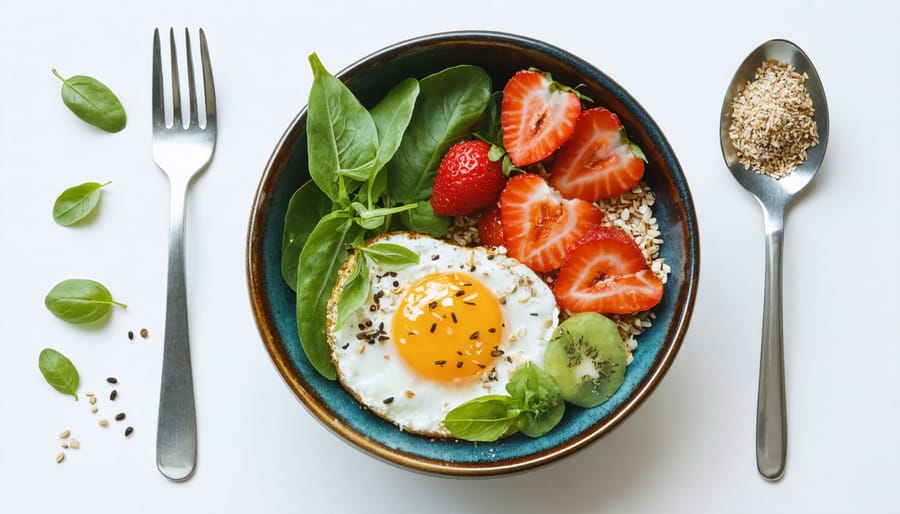
Lunch and Dinner Solutions
Ready to transform your lunch and dinner routine with B12-rich plant-based options? Let’s explore some delicious ways to boost your B12 intake! One of my favorite lunch solutions is a power bowl featuring fortified nutritional yeast sprinkled over quinoa and roasted vegetables. The cheesy, nutty flavor adds a delightful kick while sneaking in that essential B12.
For a quick lunch fix, try spreading fortified plant-based cream cheese on whole-grain bread, topped with sliced tomatoes and microgreens. Many vegan cream cheese brands are now fortified with B12, making them both tasty and nutritious.
When dinner rolls around, get creative with tempeh tacos seasoned with B12-fortified taco seasoning, or toss together a hearty stir-fry using B12-fortified plant-based meat alternatives. I love adding fortified plant milk to creamy pasta sauces for an extra B12 boost – it’s a game-changer!
Don’t forget about nori sheets in your sushi bowls or as a crispy garnish for soups and salads. While they contain small amounts of B12, every little bit counts when you’re plant-based. Remember to check labels for fortified products, as they’re your best friends for maintaining healthy B12 levels while enjoying delicious, satisfying meals.
Signs You’re Getting It Right
When your B12 levels are in check, your body has a way of letting you know! You’ll likely notice steady energy levels throughout the day, without those dreaded afternoon crashes. Mental clarity is another positive sign – if you’re feeling sharp and focused, that’s your body telling you you’re doing something right.
Healthy-looking nails, pink gums, and that natural glow in your complexion are all subtle indicators that your B12 intake is on point. You might also notice you’re bouncing back quickly after workouts and maintaining a positive mood – both signs that your B12 levels are supporting your overall wellbeing.
However, it’s important to remember that these signs, while encouraging, shouldn’t replace regular health check-ups. I always recommend getting your B12 levels tested annually, especially if you’re new to a plant-based lifestyle. Many of my readers share that they feel most confident when they combine paying attention to their body’s signals with professional guidance.
Consider scheduling a check-up if you’re consistently feeling great – it’s a perfect opportunity to confirm your plant-based B12 strategy is working. Your healthcare provider can celebrate your success with you and make any necessary tweaks to keep you thriving. Remember, feeling good and having the numbers to back it up is the ultimate win-win!
Maintaining healthy B12 levels while following a plant-based lifestyle doesn’t have to be complicated or overwhelming. By incorporating fortified foods, reliable supplements, and regular health check-ups into your routine, you can thrive on your plant-based journey. Remember that everyone’s needs are different, so listen to your body and work with your healthcare provider to find the right B12 strategy for you. Whether you’re new to plant-based eating or a seasoned veteran, staying informed about your B12 needs is an act of self-care that will support your long-term health and wellbeing. Keep exploring new fortified foods, stay consistent with your supplementation, and celebrate the positive choice you’re making for yourself and the planet. Your future self will thank you for taking these mindful steps toward optimal nutrition today.

